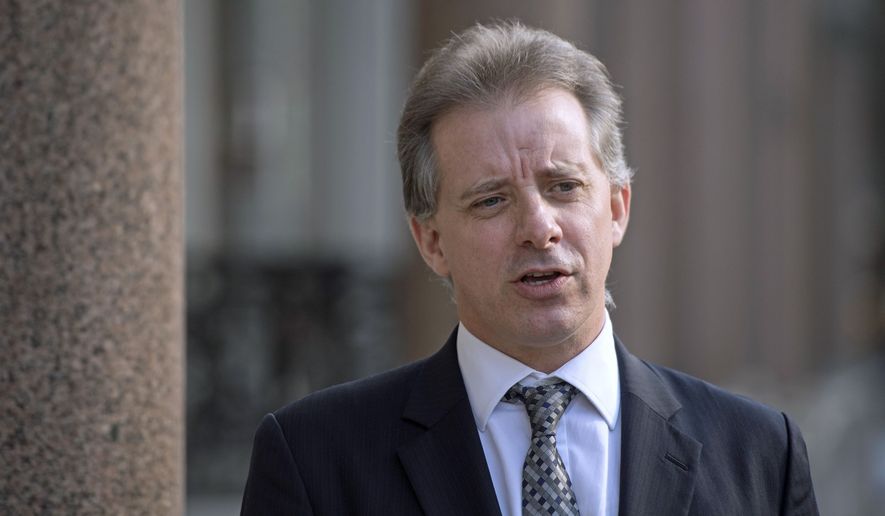The FBI judged Christopher Steele’s anti-Trump information as only “minimally corroborated,” according to a declassified document.
Yet the bureau used his reports to obtain a yearlong wiretap on a Trump campaign volunteer and to frame its Russia collusion investigation.
The FBI’s official “Human Source Validation Report” on Mr. Steele was provided to The Washington Times under the Freedom of Information Act. It said it had only “medium confidence” in his work.
The report confirms parts of a declassified memo issued by Rep. Devin Nunes, California Republican, last winter. The memo detailed how the FBI used Mr. Steele’s discredited dossier to target the Trump campaign. The committee didn’t reproduce the source validation document and only quoted from it sparingly.
Democrats derided Mr. Nunes, chairman of the House Permanent Select Committee on Intelligence, at the time for issuing what they said was a misleading memo.
The Times asked the FBI for all documents pertaining to its relationship with Mr. Steele as a “confidential human source.” The highly redacted Human Source Validation Report proves that Mr. Nunes correctly relayed to the public what the FBI said about Mr. Steele’s reliability.
DOCUMENT: Read the FBI documents about the anti-Trump Steel dossier
The FBI fired Mr. Steele in November 2016 after he admitted to leaking his anti-Trump charges to Mother Jones magazine days before the election. He also disclosed he was an FBI source.
After the firing, the FBI wrote its first, and apparently only, assessment of his reliability. The FBI said it had only “medium confidence” in his information “based on the fact that [his] reporting has been minimally corroborated.”
That poor grade did not stop the FBI from continuing to use Mr. Steele’s Democratic Party-financed dossier to convince judges to place a wiretap on Trump volunteer Carter Page, starting in October 2016. The FBI renewed the wiretap three more times during 2017.
Previously the FBI released the warrant application in a highly censored form.
It validated Mr. Nunes’ reporting by showing that the dossier’s charges against Mr. Page made up the bulk of evidence to convince judges that the energy investor was the agent of a foreign country.
The applications also showed, as Mr. Nunes reported, that the FBI buttressed the warrant by citing a Yahoo News story on Mr. Page’s trip to Moscow in July 2016. But the source for that story was Mr. Steele himself, so the article was meaningless in terms of confirmation.
Mr. Nunes also correctly reported that the FBI failed to tell the judges that Mr. Steele was funded by the Hillary Clinton campaign and the Democratic Party.
Mr. Steele levels about a dozen collusion charges against Trump people and others.
For example, he said Mr. Page and former campaign manager Paul Manafort coordinated Russian computer hacking with Moscow. Both deny the charge. There is no public evidence the two know or spoke with each other.
Mr. Page has long denied he is a foreign agent or that he spoke to Kremlin people cited by Mr. Steele. He has not been charged.
• Rowan Scarborough can be reached at rscarborough@washingtontimes.com.




Please read our comment policy before commenting.